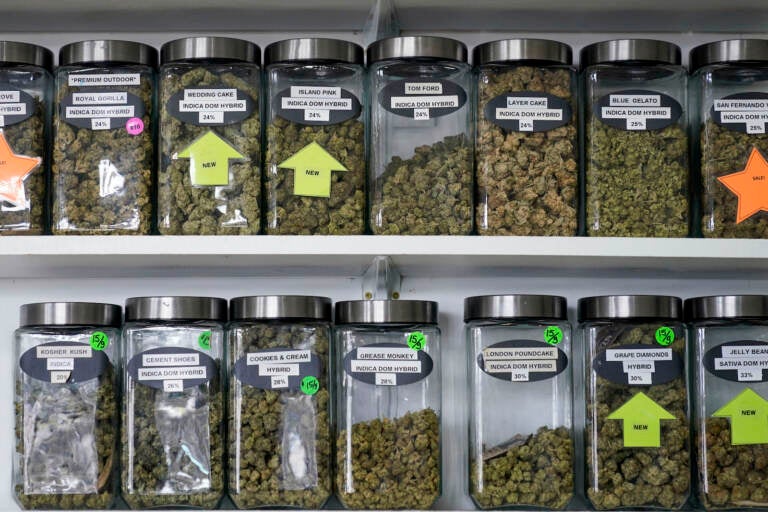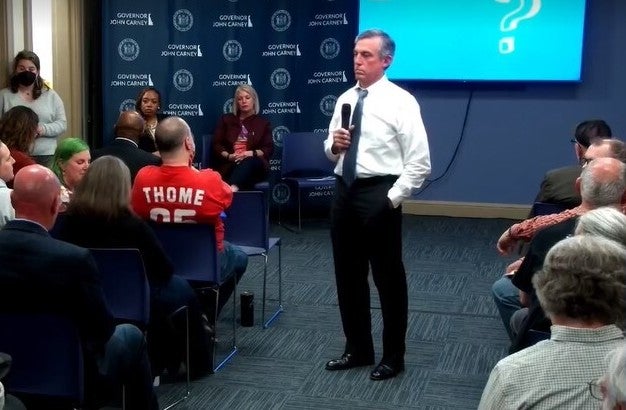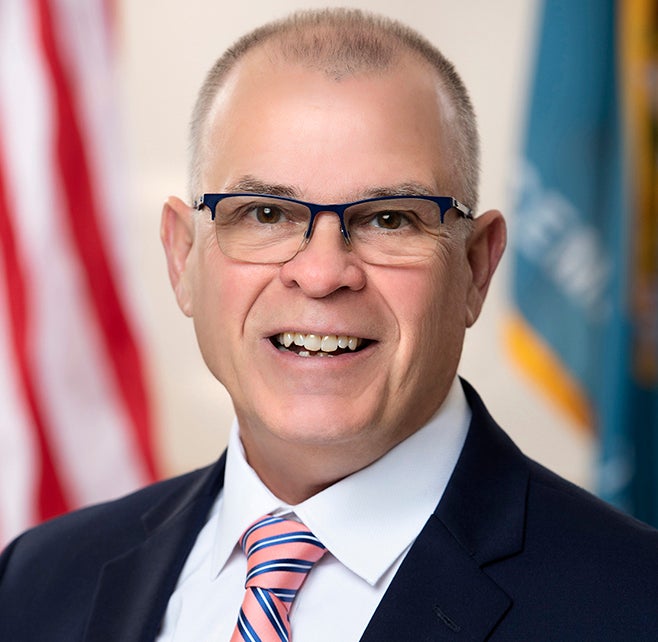When will Delaware’s first ‘marijuana mart’ open? That’s for state weed czar to decide
Officials must follow a meticulous series of steps over the next 16 months before licenses can be issued to grow, make, test, and sell products.
Listen 1:48
Retail stores whose shelves are stocked with marijuana, like this one in New York state, won't open in Delaware until late 2024 at the earliest. (AP Photo/Seth Wenig, File)
Now that marijuana is legal in Delaware, residents itching to stroll into their neighborhood weed store to buy buds, hash, vape oil, or edibles better not hold their breath.
None of the 30 retail outlets authorized under the new law can secure a license until at least September 2024 —16 months from now.
And it would likely be a few months after that before Willie’s Weed Emporium or Candace’s Cannabis Cove could actually begin selling marijuana products to adults age 21 and older.
In the meantime, users must resort to acquiring marijuana the way most did when it was illegal, from someone who is still breaking the law by selling it (though they can give it away legally).
That’s because Delaware’s new 45-page law that aims to create a thriving and well-regulated marijuana industry — growing, manufacturing, testing, and selling — requires a delayed rollout.
That statute and a companion law that legalized weed became law last month as staunch foe Gov. John Carney let it happen without his signature. In a written statement on April 21 where he announced his decision, Carney said he remains concerned about potential effects on children, highway safety, and “on our poorest neighborhoods, where I believe a legal marijuana industry will have a disproportionately negative impact.”

The regulatory law outlines a methodical series of steps that start with Carney’s appointment of a marijuana commissioner who must then be confirmed by the state Senate. The governor has until Sept. 29, which is 90 days after the law takes effect on July 1, to name the person to run an industry Carney doesn’t want in his state.
The weed czar will be responsible for setting up an oversight office, establishing copious regulations to govern the industry, and issuing 125 licenses.
Here’s how the licenses will be allocated:
- 60 for indoor and outdoor growing operations
- 30 for businesses that manufacture gummies, candies, oils, and other non-leaf products
- 30 for retailers
- 5 for testers that must ensure quality and accuracy of products and labeling
Carney’s office did not respond to a request for comment from WHYY News for this article. But when the governor announced he would not veto the bills, he said his administration would “closely evaluate the placement of marijuana dispensaries and other businesses, to ensure they do not become a blight on already disadvantaged communities,” adding that his goal was to “ensure Delaware has a robust regulatory system that protects the interests of the most vulnerable Delawareans.”
Colorado cannabis attorney Brian Vicente, who has scores of clients nationwide, said that beyond the state revenue generated from the 15% tax on sales, the new industry will provide a big boost to Delaware’s economy.
“We could see as many as 10,000 new jobs in Delaware,” Vicente said. “This is a significant number of new businesses. Some of those will employ 10 or a dozen folks. Some of these growers will employ potentially 50. So these are going to be a fairly significant job producer for the state.”

‘There are a lot of ways they can get this process wrong’
State Rep. Ed Osienski (D), the chief sponsor of both marijuana bills, said he’s concerned the rollout of licenses might get delayed by red tape and other issues, but is confident the governor will take his own legal responsibility seriously.
“I did talk to some of the governor’s staff and they said they have started a conversation about a possible commissioner,” Osienski said. “So that was good news. I hope they do select someone because it all hinges on that. That’s the first move.”

Zoë Patchell, who heads the Cannabis Advocacy Network of Delaware, says a commissioner who supports the industry and the interests of people who use marijuana recreationally is paramount.
“It’s a critical juncture and something that we’re going to be heavily involved in,” Patchell said. “We need regulators that understand this pre-existing market as well as the needs of consumers.”
She said the implementation of the medical marijuana market in 2015 was marred by delays and other problems.
“I’m a little worried,” Patchell said. “There are a lot of ways that they can get this process wrong moving forward that will greatly undermine the intent behind the laws that were passed in March.
“So we’re hoping that the focus is on fostering a competitive, consumer-friendly market that will be conducive to the transition from the illicit market to the legal market, as well as lawmakers’ goals of outcompeting the illicit market.”

While the regulatory law states it aims to “effectively eliminate” illegal sales, Patchell echoed others who said it won’t disappear and could only be reduced dramatically with competitive pricing at regulated stores.
Peter Murphy, a Wilmington lawyer who has cannabis clients in some of the other 21 states with legal weed, seconded that sentiment.
“I think the fundamental flaw is kind of looking at it as well, ‘This will crush the illegal market,’” Murphy said. “And I think that’s it’s kind of naive because the market is the market. There has been a cannabis market in the U.S. forever. So if you’re going to eliminate the illegal market, you’re going to have to do it through competition.”

To Murphy, the state has to make the consumer think “it’s better off for me to get it here,” and not because of anything punitive. “It has to appeal to something about that consumer, whether it’s the overall quality and safety of the product, the price. There has to be a way that you can bring those consumers in.”
Before you sell, you must cultivate
The reality, though, is that Delaware is entering new territory, albeit one lawmakers carefully crafted over several years in hopes of creating a successful legal market, Rep. Osienski said.
The law requires the commissioner to start accepting applications in the various categories — growing, manufacturing, testing, and retailing — by Aug. 1, 2024.
A month later, the czar has to begin issuing at least some licenses.
That will come after sifting through applications that must meet a strict set of requirements. They will be ranked on criteria such as the business plan, experience, safety plans, and social responsibility metrics that include the recruitment and hiring of people of color, women, and veterans.
But by Oct. 1, 2024, a whopping 60 cultivation licenses must be issued — from outdoor plots as big as five acres, to smaller, perhaps vertical, indoor ones — as long as there are enough qualifying bids.
“It’s in steps because you’ve got to have cultivation first,” Osienski said. “So they’re the first ones to be awarded because there’s nothing to sell until there’s something cultivated. And it takes time to get a crop up and going.”
Next will come the licenses to manufacture edibles and other marijuana products. A total of 30 will be issued, and that must happen by Nov.1, 2024.
Then there’s the five licenses to test products to ensure they meet purity, potency, and and other state standards. Finally, the 30 retail licenses will be awarded.
Osienski said the retailers will be “the last ones, because you’ve got to have product up and available before the retailers can get up and running.”
Those licenses must be granted by Feb. 1, 2025 — a couple of weeks after Carney leaves office.
Prohibition vs. legalization
Osienski said any prediction on when the first marijuana mart would open “would be purely speculative.”
But Osienski said that unless Carney’s commissioner sets a date, he thinks “the absolute earliest a licensed retailer would choose to open” would be at least three months “after the first crop is planted by a licensed cultivator, so long as a licensed testing facility is open.”
Under that scenario, no stores would be open until after New Year’s Day in 2025.
But Patchell said she’s hoping for retail sales to begin in time for the 2024 holidays, shortly before Carney’s second and final four-year term ends on Jan. 20, 2025.
“Barring new delays, it looks like the first legal sales will begin sometime between Thanksgiving of 2024 and New Year’s of 2025,” Patchell said. “Our group is going to stay diligent and heavily involved in that process to ensure that those deadlines are met.”
Murphy, the cannabis lawyer, says the state has a steep but surmountable challenge in meeting them.
“The law has a certain structure to it, but there’s a lot to fill in and there’s not an unlimited amount of time to do that,” Murphy said.
He labeled the timeline “ambitious, I really would, knowing what goes into getting all those things done. But it doesn’t mean they can’t do it. But it’s going to take hiring and people training. There’s a lot that will go into that.”
Vicente, the Colorado attorney, says Delaware can use its experience in the medical cannabis business and tap into expertise around the country.
“It’s going to be an adjustment for the state,” Vicente said. “But we’ve shown for the last 10-plus years that cannabis can be regulated appropriately. And I think Delaware has the infrastructure to begin doing that.”
Even though Carney relented in the face of a likely veto override, should he have taken that path as he successfuly did a year ago, Vicente has a simple message for the reluctant politician.
“I think the governor needs to recognize what Delaware citizens have long recognized, that cannabis prohibition is a way more harmful policy than legalization,” Vicente said. “And when we tax and regulate this product, make sure it just gets into the hands of those 21 and over, we’re providing new tax revenue streams for the state. And that’s simply a better policy. We’ve seen that in state after state.”
“So it’s a new era for Delaware,” Vicente said. “This has always been a people-led movement, and elected officials are frequently dragging their feet like the governor is. But the important thing is he did allow it to move forward and Delaware will be a better place because of it.”

Get daily updates from WHYY News!
WHYY is your source for fact-based, in-depth journalism and information. As a nonprofit organization, we rely on financial support from readers like you. Please give today.







